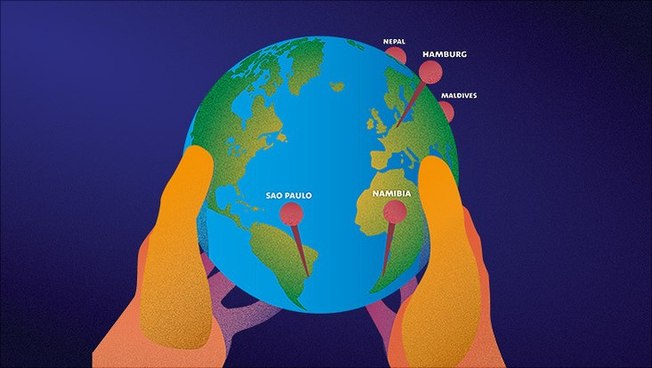19 September 2024
Hamburg Climate Futures Outlook 2024Studies show how climate adaptation succeeds

Photo: UHH/CLICCS
“Successfully adapting to the consequences of climate change is about as difficult and challenging as reducing all emissions, and neither of these tasks can be neglected,” says Prof. Dr. Anita Engels, professor of sociology at CLICCS and author of the study on which 73 authors collaborated.
Based on 9 case studies (Nepal, Namibia, Lower Saxony, São Paulo, Ho Chi Minh City, Hamburg, North Frisia, Taiwan, the Maldives), CLICCS researchers are analyzing very different measures to adapt to climate risks. Currently, none of the case studies reveals a sustainable adaptation strategy. Hamburg, North Frisia, and Ho Chi Minh City, however, are taking first steps towards a transformational, meaning fundamental, adaptation. The research team also identified the central conditions for sustainable climate adaptation. “Sustainability is not just a nice perk,” says Prof. Dr. Beate Ratter, professor of geography at CLICCS and also one of the study’s authors. “Where adaptation has not been thoroughly considered, side effects can undermine success.” For example, certain measures in coastal protection may help in case of flooding, but in the long term, wash away fortifying sediments or harm protective coral reefs. If forests are cultivated as monocultures, they are especially susceptible to pests.
The study divided the quality of adaptation measures into 3 categories: the first stage is direct crisis management (coping), for example, acute measures in cases of flood or drought. More foresighted measures comprise the second stage, with incremental preventive adaptations designed to help prevent negative climate effects in the near future. The third stage, or sustainable adaptation, requires the fundamentally changing structures and processes—a transformation. These measures are effective in the long term, reduce risks, and are shaped and accepted by local populations. They do not produce, as far as possible, additional emissions and they are based on the UN Sustainability Goals (SDGs) so that they do not cause harm in other areas. For example, they conserve biodiversity and natural resources.
Adaptation is also urgent because the interplay of climate change and natural climate fluctuations is already doing serious harm to ecosystems and economies, as CLICCS’ current climate simulations show. “In the future, there may be extreme weather events, also in combination and bundled,” says Prof. Dr. Jochem Marotzke, climate researcher at the Max Planck Institute for Meteorology and another of the study’s authors. “This brings greater risks and can have catastrophic consequences. We have to prepare ourselves thoroughly.”
At the same time, CO2 emissions need to be reduced quickly and decidedly. Yet the world is barely making progress. The 10 key societal processes that are most crucial were identified for the first time in the CLICCS 2021 report. There are 3 especially that currently prevent us from meeting the goals set forth in the Paris Climate Agreement: corporate strategies; consumption patterns; and a lack of divestment, meaning taking funding away from fossil fuels. “We are once again investing massively in oil, gas, and coal. The competition on financial markets needs, however, to run counter to this. People need to be convinced that investment in fossil fuels simply no longer pay off in the long run,” says Engels. The only thing that can help here is legally binding regulations and conditions decreed by individual countries and in the UN climate negotiations.
What can societies do concretely? The analysis shows that social movement can compel policymakers and companies to prioritize climate goals, leveraging either support or pressure. Furthermore, we need measurable goals and clear obligations to reduce greenhouse gases, and ones that will be implemented and monitored. This is the only way that climate protection can be granted the necessary qualitative push. Climate trials can prompt and accelerate this process. And when societies enjoy greater social justice, the chances for successful climate protection and successful adaptation also increase. And local populations should help develop strategies and contribute their knowledge, their experience, and their commitment to the success of the measures.
Original publication:
Engels, Anita; Jochem Marotzke; Beate Ratter; Eduardo Gonçalves Gresse; Andrés López-Rivera; Anna Pagnone; Jan Wilkens (eds.); (2024): Hamburg Climate Futures Outlook 2024. Conditions for Sustainable Climate Change Adaptation. Cluster of Excellence Climate, Climatic Change, and Society (CLICCS). transcript Verlag, Bielefeld (Germany).
https://doi.org/10.14361/9783839470817
Downloads:
Download the complete study and other material (key visual, evaluation of the case studies) (graphic, jpg):
https://www.cliccs.uni-hamburg.de/de/publications/hamburg-climate-futures-outlook.html
The Hamburg Climate Futures Outlooks is published annually. It analyzes physical and social dynamics and looks to see whether climate futures are not only possible but plausible.
Seventy-three researchers from CLICCS collaborated as authors. They work in different natural and social science disciplines, economics, and law. Twenty-eight national and international experts reviewed their work.
The University of Hamburg’s Cluster of Excellence Climate, Climatic Change, and Society (CLICCS) is financed by the German Research Foundation. It is based at the Center for Earth System Research and Sustainability (CEN) at the University of Hamburg and cooperates closely with 11 partner institutions, including the Max Planck Institute for Meteorology, the Helmholtz-Zentrum Hereon GmbH, and the German Climate Computing Center.
Do you need photos for reports about the University of Hamburg? You can find high-resolution press photos in print quality for free in our image database.
Are you looking for an expert for an article on a particular topic? The University’s experts service offers a search by department and key word which you can use to get contact details.
